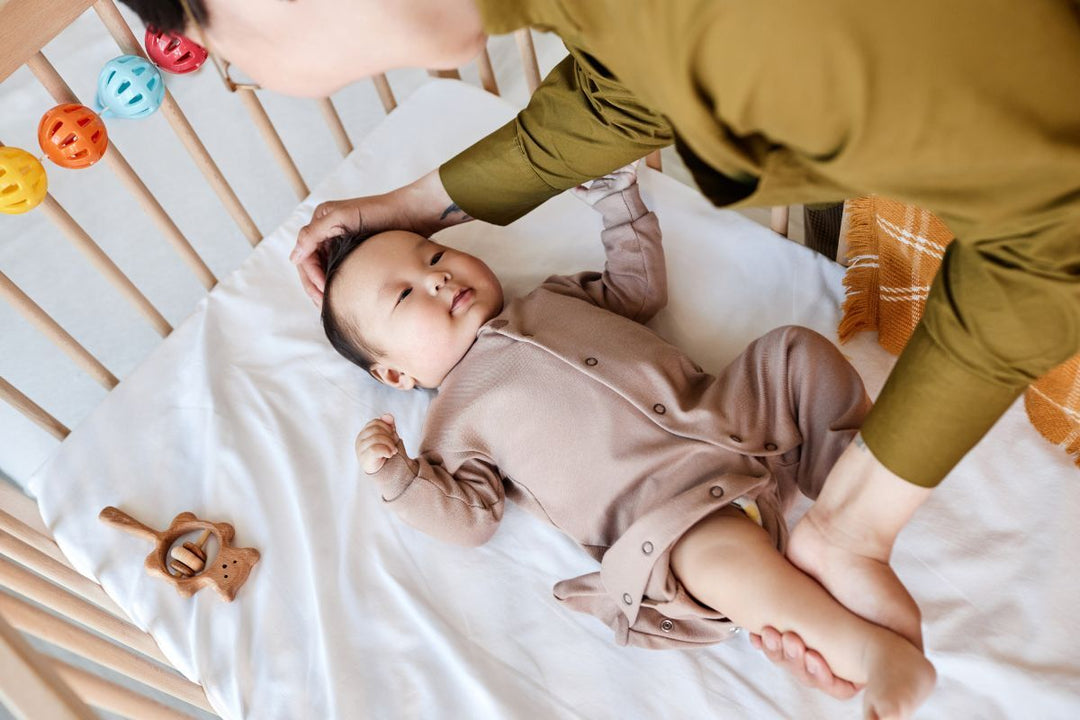Congratulations to the mum-to-be! Finding out you’re pregnant is a moment of pure joy and maybe a little bit of nerves. Deciding when to announce your pregnancy adds to that excitement. However, some mums may feel uncertain and a little overwhelmed about choosing the perfect time—and that’s perfectly okay. Whether it’s your first time or you’re welcoming another little one to the family, this guide will help you navigate through this incredible journey.
When & How to Tell Your Partner You’re Pregnant

Your partner should be your biggest support system. Telling them as soon as you know gives you both the opportunity to start and plan this journey together from the very beginning. This includes going to your prenatal check-ups, navigating your pregnancy symptoms, and making big decisions about the future.
You can surprise them with a creative reveal of a positive pregnancy test or simply share the news in a quiet, intimate moment. However you choose to tell them, it’s important to remember that this is a journey you should be embarking on together.
When & How to Tell Your Parents and Immediate Family You’re Pregnant
Your pregnancy will be big news for your parents, especially if this is their first grandchild. You may want to consider telling your family early on so they can share in the excitement; or if you have family members close by, you may also ask for help when you need an extra set of hands.
For some first-time mums-to-be, announcing their pregnancy with family can be a bit overwhelming. If you need time to process your emotions, it’s okay to wait and find the timing that feels right for you.
You can make your baby announcement in a special way, like hosting a small family dinner or even presenting an ultrasound photo as a surprise. They will be overjoyed to share this special moment with you.
When & How to Tell Your Close Friends You’re Pregnant
Announcing your pregnancy to your closest friends early means you’ll have a trusted circle to confide in, especially during the emotional ups and downs in the early weeks. However, some may also want to delay the announcement due to the uncertainty that often comes with early pregnancy. Waiting until after the first trimester may give you more peace of mind, as the risk of miscarriage decreases significantly. Both approaches are valid, and it’s about what feels right for you and your partner.
Choosing how to announce your pregnancy depends on your personal style and relationship with your friends. You might opt for something simple, like telling them over coffee or brunch, or go for a fun reveal like a casual party.
When & How to Tell Your Employer and Coworkers You’re Pregnant
You may inform your employer early in the pregnancy to discuss any necessary arrangements ahead of time before you go on maternity leave. This is particularly essential if your job requires you to do physical labour like standing for long periods, lifting heavy objects, or being exposed to chemicals.
The Fair Work Act of 2009 requires employees to give an official notice at least 10 weeks before starting their parental leave, which can be around the beginning of the third trimester. Look into the legal and company leave and work arrangements you’re entitled to so you can be prepared for the discussion with your employer.
For your coworkers, you might opt for a more casual approach, perhaps over lunch or in a team meeting.
The Pros & Cons of Waiting to Announce Your Pregnancy

Deciding whether to wait or announce your pregnancy right away is a personal choice that may come with both benefits and challenges.
Pros
- If you’ve had a history of pregnancy loss, stillbirth, or difficulty conceiving, you may want to consider waiting over the 12-week mark until you’re more confident that the pregnancy is progressing smoothly.
- If you feel overwhelmed or anxious about the pregnancy, sharing the news later can give you some time to process your emotions and adjust to the changes happening within your body.
- You can ensure your pregnancy announcements are on your terms and plan when and how to share the news with the people who matter to you.
Cons
- If you’re experiencing early pregnancy symptoms or having difficulty processing your emotions, keeping the news from your loved ones might add to your stress or feelings of isolation.
- If your job demands physical labour, you might struggle with managing work without informing your employer. This could also put unnecessary strain on your body.
- Friends and family might find out the news from other sources instead of you sharing the news with them directly.
What If I Tell People I’m Pregnant and Then Have a Miscarriage?
While many parents-to-be share the news once they’ve passed the 12-week period when most miscarriages occur, pregnancy loss can still happen at any stage. If this happens, remember that you are not alone. In Australia, it’s estimated that up to 1 in 4 pregnancies end in miscarriage, affecting over 100,00 couples every year. [1] Making your baby announcement early means that you have a support system to lean on during this difficult time.
Acknowledge that the pregnancy existed and that your baby was real, no matter how short their time with you was. Honour your emotions and memories tied to your pregnancy so you can move forward, even little by little. Sharing your feelings with your partner, family, and friends allows them to offer the support you need during this time. You may also consider talking to a counsellor to help you develop healthy coping strategies and guide you through the healing process.
Focus on your health and seek the medical care and support you need. Take care of your body by following your doctor’s advice, resting, and giving yourself time to heal physically.
And remember, not all hope is lost when you’ve experienced pregnancy loss. At least 85% of women who have previously had a miscarriage are likely to have healthy pregnancies in the future. [2] There are also tests you can take to avert another miscarriage. You can still look forward to a healthy pregnancy with the right care and support.
What Should You Do During Your Pregnancy?

Pregnancy is a time of transformation, and there are a few key things you can do to ensure a healthy and smooth journey:
- Visit your healthcare provider regularly. Regular prenatal check-ups are essential for monitoring your baby’s growth and your health throughout the pregnancy. Your doctor will keep an eye on key milestones, perform important tests, and offer guidance on how to take care of yourself and your baby.
- Eat a balanced diet. Your baby relies on your diet to sustain their nutritional needs. Focus on eating a variety of nutritious foods, including fruits, vegetables, whole grains, and lean proteins. Don’t forget to drink plenty of water to stay hydrated.
- Wear compression garments for comfort. Pregnancy leggings are designed to provide gentle support around your growing belly throughout the pregnancy. They can also help reduce pressure on your back and maintain pelvic floor muscle strength, which helps you move around more easily.
- Stay active. Engaging in regular physical activities may help you combat pregnancy-related symptoms, such as insomnia, muscle pain, excessive weight gain, and mood problems. Consult your doctor about what exercises you can safely incorporate into your daily routine.
- Take time to learn about pregnancy, childbirth, and newborn care. Attending prenatal classes or reading trusted resources can help you feel more confident and prepared for the journey ahead.
The Best Time Is When It Feels Right to You
Deciding when to announce your pregnancy is a deeply personal choice, and there’s no “right” or “wrong” time to do it. Share the joy when you’re emotionally, mentally, and physically comfortable. If you feel anxious or overwhelmed, you can either take your time or tell them right away to seek support and encouragement. The most important thing is to surround yourself with those who understand and respect your choice. After all, it’s your journey, and you deserve to experience it in a way that brings you peace of mind.
FAQs
1. Why are 12 weeks pregnant considered safe?
Research shows that at 8 weeks, there’s a 92% chance of having a successful pregnancy. By 12 weeks, those chances go up to 97%. [3] It’s also when the foetus’ development is more established, and all the organs, muscles, limbs, bones, and sex organs are well developed. [4]
2. When do most miscarriages occur?
About 80% of miscarriages happen within the first trimester, often before the 12-week mark. During this time, your little one goes through a critical period of development and change. These changes come with a risk that the pregnancy might not carry to term. [5]
3. When do most people announce pregnancy?
Many mums choose to wait until after the first trimester or the 12-week period, when chances of a successful pregnancy increase significantly. Sharing the news when it is safe to announce pregnancy gives you some peace of mind that your little one has passed the most delicate stage of development.
4. When do you get your first ultrasound?
Some women may choose to have an early ultrasound (dating scan) within 8 to 9 weeks for reassurance. Others may get their first ultrasound (nuchal translucency scan) later, within 11 to 13 weeks in the first trimester to calculate their due date. This is also where it is estimated if the baby has a potential risk of having Down Syndrome and other chromosomal abnormalities. [6]
5. When does maternity leave start?
Every country has different laws and regulations regarding maternity leave. In Australia, you can start your leave up to 6 weeks before your expected due date or earlier depending on your agreement with your employer. You can read Australia’s Fair Work Act to understand your rights and entitlements, including the minimum notice period and how maternity leave works in different situations.













